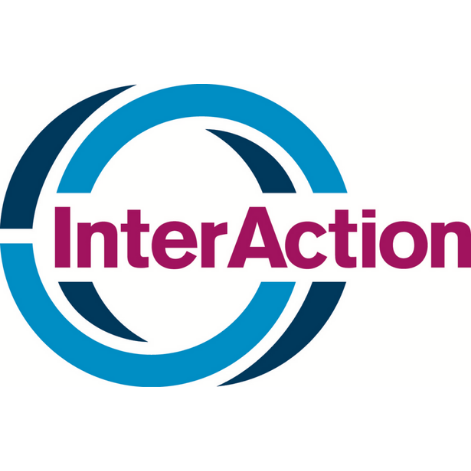
InterAction
InterAction is a consortium of NGOs working internationally in humanitarian and development work.
Overview
InterAction was founded in 1984 under the name the American Council for Voluntary International Action. It is a 501(c)3 organization and receives funding from membership dues, foundations and “stakeholders such as the U.S. government, UN agencies and partner institutions.”
According to its mission statement, “InterAction is a convener, thought leader, and voice for NGOs working to eliminate extreme poverty, strengthen human rights and citizen participation, safeguard a sustainable planet, promote peace, and ensure dignity for all people.”
As a consortium of NGOs working internationally in humanitarian and development work, InterAction has some overlap in membership with National Organizations Active in Disasters (National VOAD), as well as international consortia such as the International Council for Voluntary Agencies (ICVA) and Steering Committee for Humanitarian Response (SCHR), both based in Geneva.
InterAction focuses on 12 issues; among them, the following are those more specific to their work on disasters:
- “Crises and Countries in Conflict: InterAction monitors and offers support to members working to address crises happening around the world, such as natural disasters, conflict where civilians are displaced or harmed by ongoing conflicts.
- Global and Public Policy Positions: InterAction and its members advocate for U.S. Government funding of poverty-focused development programs and humanitarian relief, while also engaging on issues like foreign assistance reform, democracy, rights, and governance, global health, food security and nutrition, water and sanitation, and humanitarian access.
- Humanitarian Coordination: InterAction serves as a hub for its members responding to humanitarian emergencies by coordinating information and engaging with the United Nations and the U.S. government to improve timeliness and accountability for effective responses. InterAction is one of three global NGO consortia with representation at the UN-led Inter-Agency Standing Committee (IASC), a global governance body that ensures coherence of preparedness and response efforts, formulate policy, and agree on priorities for strengthened humanitarian action.
- Humanitarian Practice: InterAction supports the efforts of humanitarian agencies working together to provide a predictable, coordinated, well-resourced and holistic response to conflicts and natural disasters.
- Prevention of Sexual Abuse, Exploitation and Harassment: InterAction works with Member organizations to drive forward a holistic and integrated approach to the prevention and response of sexual exploitation, abuse, and harassment (PSEAH) for staff and the communities they serve in both humanitarian and development settings.
- Protection of Civilians in Armed Conflict: InterAction focuses on reducing the risk civilians experience during crises by educating its members, partners, and world leaders to ensure non-combatants are respected and protected as outlined by international humanitarian law.
- Risk Management and Regulatory Issues: InterAction organizes tools and research for nonprofits operating in high-risk environments to better identify, measure, and manage risk within their programming and policies, while also advocating to ensure regulations do not unnecessarily restrict humanitarian operations.
- U.S. Foreign Assistance: InterAction strives to educate policymakers about the critical role of U.S. foreign assistance and advocates for robust federal funding for poverty-focused international development and humanitarian programs implemented by U.S.-based NGOs.”
Key Facts
- Results-based protection is an InterAction initiative that uses a problem-solving approach to “address complexity and the ever-changing environment that surrounds protection issues in humanitarian action. It underscores the importance of starting from the perspective of those experiencing violence, coercion, and deliberate deprivation, and embraces aspects of systems-practice, design-thinking, and other comparable methods that emphasize iteration, adaptability, relationships, interconnectedness, and strategic collaboration to achieve protection outcomes.”
- InterAction developed the CEO Pledge on Preventing Sexual Abuse, Exploitation, and Harassment by and of NGO Staff. Signatories said, “this represents our commitment to practices and policies that will not only protect our own staff, but also the communities we serve. While standards and legal frames already exist, this pledge is our promise to take additional steps towards greater success.”
- The maintenance of key standards is important to InterAction. They work to increase NGO accountability by supporting member organizations to “ensure they adhere to certain ethical guidelines that govern NGO governance, financial reporting, fundraising, public relations, management practice, human resources, and program services.”
- InterAction 180 members manage more than $15 billion in programs worldwide. They also work in almost every country around the world.
- InterAction has a staff team of approximately 50 people. Their staff team includes people with a variety of skills, including “policy advocates, researchers, practitioners, fellows, and communicators.” In addition to the Executive Leadership, Administration and Fellows, the staff is divided into three program team areas: Global Development Policy and Learning, Humanitarian Policy and Practice and Membership and Public Engagement.
How to Help
- Provide ongoing operational and administrative support to InterAction’s member organizations. Many InterAction member organizations may be limited in their service provision depending upon how much money is raised – often in a crisis – to support their work. Administrative or ongoing operational funding allows them to concentrate their efforts on service provision.
- Support the ability of the humanitarian team to continue their efforts in advancing the NGO voice in global policy and practice shifts. Long-term, multi-year funding is particularly important to allow the organization to plan and implement multi-year strategies.
- Create your version of the CEO Pledge and encourage your grantees to do the same. International (and domestic) humanitarian aid is steeped in power relationships. During a crisis and particularly following a catastrophic disaster, women and girls are at risk for sexual exploitation and human trafficking.
What Funders Are Doing
Approximately a third of InterAction’s funding comes from membership fees. The remaining is made up of grants from governmental and philanthropic partners, including SDC, SIDA, USAID, UNHCR and, Bill & Melinda Gates Foundation, ClimateWorks Foundation, Open Society Foundations, Tides, the UPS Foundation and Wellspring Philanthropic Fund.
Learn More
- InterAction.org
- InterAction: Member Directory
- InterAction: NGO Risk Management
- InterAction: NGO Coordination Structures and the Localization Debate
We welcome the republication of our content. Please credit the Center for Disaster Philanthropy.